Water Security and Sustainable Development: A Detailed Essay
VerifiedAdded on 2022/10/03
|13
|4199
|19
Essay
AI Summary
This essay delves into the critical importance of water security for sustainable development across the globe, emphasizing its multifaceted nature and centrality to human well-being, socio-economic advancement, and environmental stability. It highlights the significant dependence of humankind on water resources and the detrimental impacts of human activities, such as population growth, urbanization, and pollution, which compromise water security and disrupt ecosystems. The essay examines the nexus between water security and various world sustainable development agendas, including poverty reduction, food security, and energy, while also addressing the challenges posed by water-related conflicts and the need for comprehensive water resource management. It further explores the concept of water security, its principles, and the anthropogenic elements impacting water resources, such as the increasing population and environmental changes. The essay concludes by underscoring the interconnectedness of water security with food security, health, and poverty eradication, advocating for coordinated global efforts and investments to ensure water sustainability for future generations. It emphasizes the need for sustainable practices in agriculture and energy production to mitigate the negative impacts on water resources and promote a water-secure world.
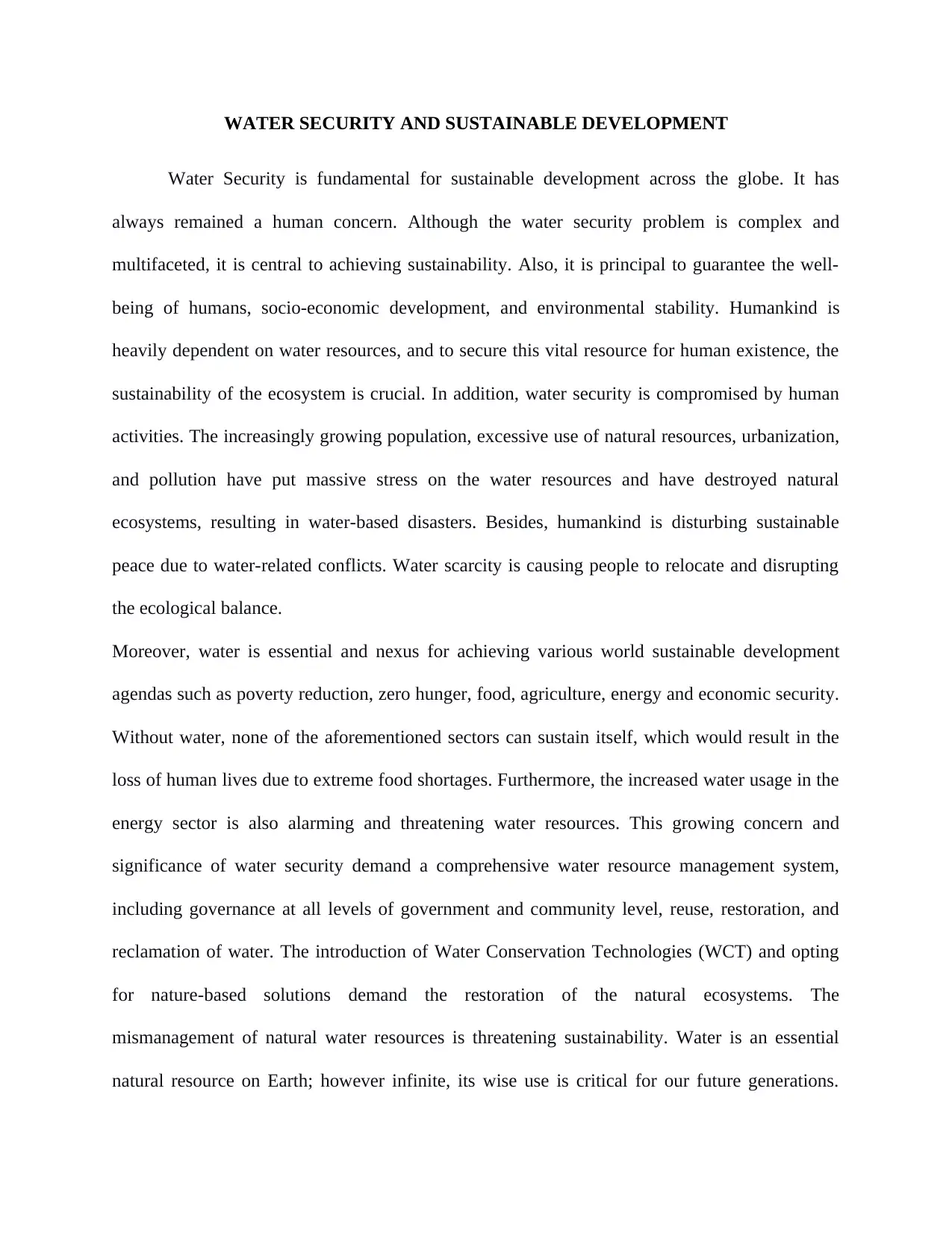
WATER SECURITY AND SUSTAINABLE DEVELOPMENT
Water Security is fundamental for sustainable development across the globe. It has
always remained a human concern. Although the water security problem is complex and
multifaceted, it is central to achieving sustainability. Also, it is principal to guarantee the well-
being of humans, socio-economic development, and environmental stability. Humankind is
heavily dependent on water resources, and to secure this vital resource for human existence, the
sustainability of the ecosystem is crucial. In addition, water security is compromised by human
activities. The increasingly growing population, excessive use of natural resources, urbanization,
and pollution have put massive stress on the water resources and have destroyed natural
ecosystems, resulting in water-based disasters. Besides, humankind is disturbing sustainable
peace due to water-related conflicts. Water scarcity is causing people to relocate and disrupting
the ecological balance.
Moreover, water is essential and nexus for achieving various world sustainable development
agendas such as poverty reduction, zero hunger, food, agriculture, energy and economic security.
Without water, none of the aforementioned sectors can sustain itself, which would result in the
loss of human lives due to extreme food shortages. Furthermore, the increased water usage in the
energy sector is also alarming and threatening water resources. This growing concern and
significance of water security demand a comprehensive water resource management system,
including governance at all levels of government and community level, reuse, restoration, and
reclamation of water. The introduction of Water Conservation Technologies (WCT) and opting
for nature-based solutions demand the restoration of the natural ecosystems. The
mismanagement of natural water resources is threatening sustainability. Water is an essential
natural resource on Earth; however infinite, its wise use is critical for our future generations.
Water Security is fundamental for sustainable development across the globe. It has
always remained a human concern. Although the water security problem is complex and
multifaceted, it is central to achieving sustainability. Also, it is principal to guarantee the well-
being of humans, socio-economic development, and environmental stability. Humankind is
heavily dependent on water resources, and to secure this vital resource for human existence, the
sustainability of the ecosystem is crucial. In addition, water security is compromised by human
activities. The increasingly growing population, excessive use of natural resources, urbanization,
and pollution have put massive stress on the water resources and have destroyed natural
ecosystems, resulting in water-based disasters. Besides, humankind is disturbing sustainable
peace due to water-related conflicts. Water scarcity is causing people to relocate and disrupting
the ecological balance.
Moreover, water is essential and nexus for achieving various world sustainable development
agendas such as poverty reduction, zero hunger, food, agriculture, energy and economic security.
Without water, none of the aforementioned sectors can sustain itself, which would result in the
loss of human lives due to extreme food shortages. Furthermore, the increased water usage in the
energy sector is also alarming and threatening water resources. This growing concern and
significance of water security demand a comprehensive water resource management system,
including governance at all levels of government and community level, reuse, restoration, and
reclamation of water. The introduction of Water Conservation Technologies (WCT) and opting
for nature-based solutions demand the restoration of the natural ecosystems. The
mismanagement of natural water resources is threatening sustainability. Water is an essential
natural resource on Earth; however infinite, its wise use is critical for our future generations.
Paraphrase This Document
Need a fresh take? Get an instant paraphrase of this document with our AI Paraphraser
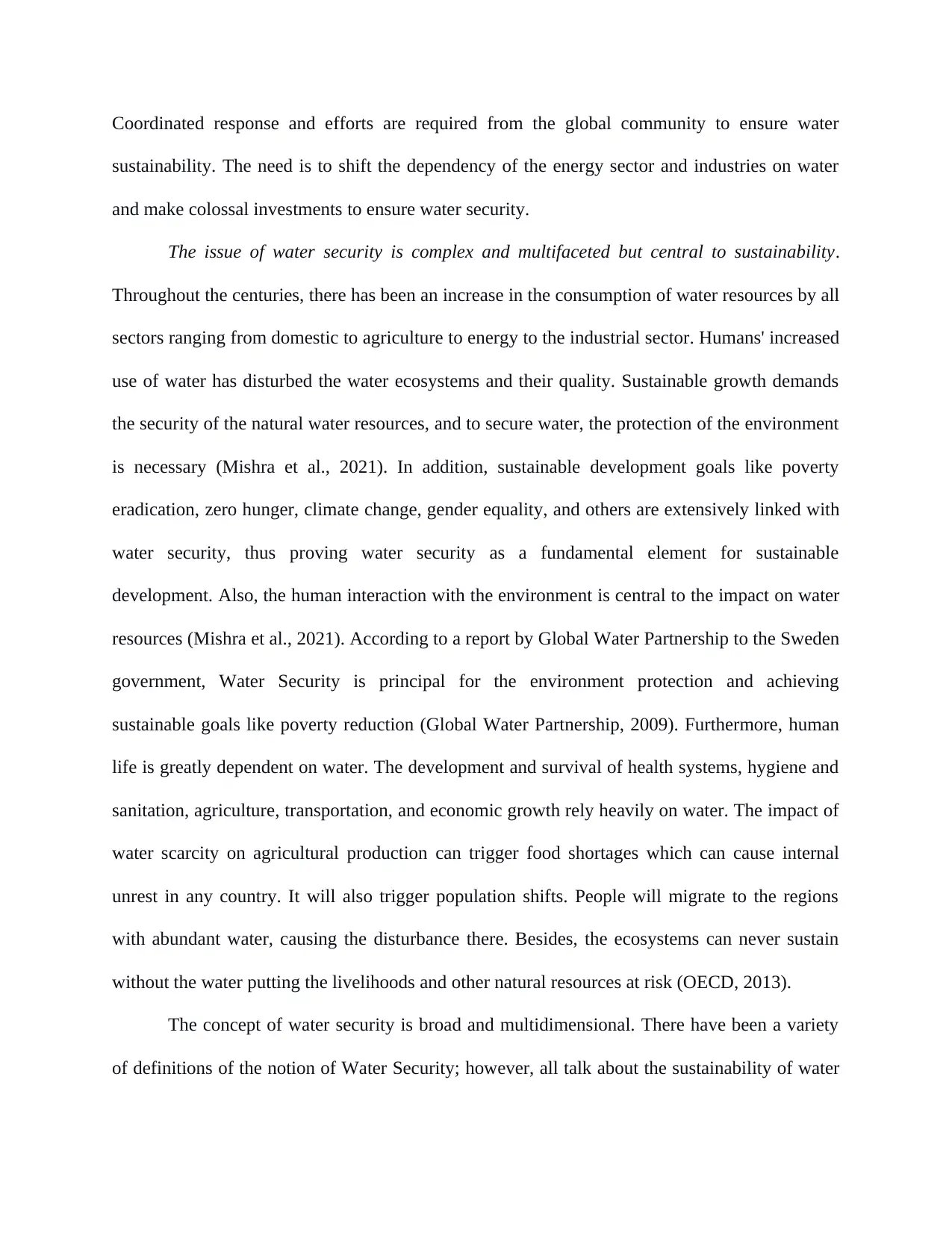
Coordinated response and efforts are required from the global community to ensure water
sustainability. The need is to shift the dependency of the energy sector and industries on water
and make colossal investments to ensure water security.
The issue of water security is complex and multifaceted but central to sustainability.
Throughout the centuries, there has been an increase in the consumption of water resources by all
sectors ranging from domestic to agriculture to energy to the industrial sector. Humans' increased
use of water has disturbed the water ecosystems and their quality. Sustainable growth demands
the security of the natural water resources, and to secure water, the protection of the environment
is necessary (Mishra et al., 2021). In addition, sustainable development goals like poverty
eradication, zero hunger, climate change, gender equality, and others are extensively linked with
water security, thus proving water security as a fundamental element for sustainable
development. Also, the human interaction with the environment is central to the impact on water
resources (Mishra et al., 2021). According to a report by Global Water Partnership to the Sweden
government, Water Security is principal for the environment protection and achieving
sustainable goals like poverty reduction (Global Water Partnership, 2009). Furthermore, human
life is greatly dependent on water. The development and survival of health systems, hygiene and
sanitation, agriculture, transportation, and economic growth rely heavily on water. The impact of
water scarcity on agricultural production can trigger food shortages which can cause internal
unrest in any country. It will also trigger population shifts. People will migrate to the regions
with abundant water, causing the disturbance there. Besides, the ecosystems can never sustain
without the water putting the livelihoods and other natural resources at risk (OECD, 2013).
The concept of water security is broad and multidimensional. There have been a variety
of definitions of the notion of Water Security; however, all talk about the sustainability of water
sustainability. The need is to shift the dependency of the energy sector and industries on water
and make colossal investments to ensure water security.
The issue of water security is complex and multifaceted but central to sustainability.
Throughout the centuries, there has been an increase in the consumption of water resources by all
sectors ranging from domestic to agriculture to energy to the industrial sector. Humans' increased
use of water has disturbed the water ecosystems and their quality. Sustainable growth demands
the security of the natural water resources, and to secure water, the protection of the environment
is necessary (Mishra et al., 2021). In addition, sustainable development goals like poverty
eradication, zero hunger, climate change, gender equality, and others are extensively linked with
water security, thus proving water security as a fundamental element for sustainable
development. Also, the human interaction with the environment is central to the impact on water
resources (Mishra et al., 2021). According to a report by Global Water Partnership to the Sweden
government, Water Security is principal for the environment protection and achieving
sustainable goals like poverty reduction (Global Water Partnership, 2009). Furthermore, human
life is greatly dependent on water. The development and survival of health systems, hygiene and
sanitation, agriculture, transportation, and economic growth rely heavily on water. The impact of
water scarcity on agricultural production can trigger food shortages which can cause internal
unrest in any country. It will also trigger population shifts. People will migrate to the regions
with abundant water, causing the disturbance there. Besides, the ecosystems can never sustain
without the water putting the livelihoods and other natural resources at risk (OECD, 2013).
The concept of water security is broad and multidimensional. There have been a variety
of definitions of the notion of Water Security; however, all talk about the sustainability of water
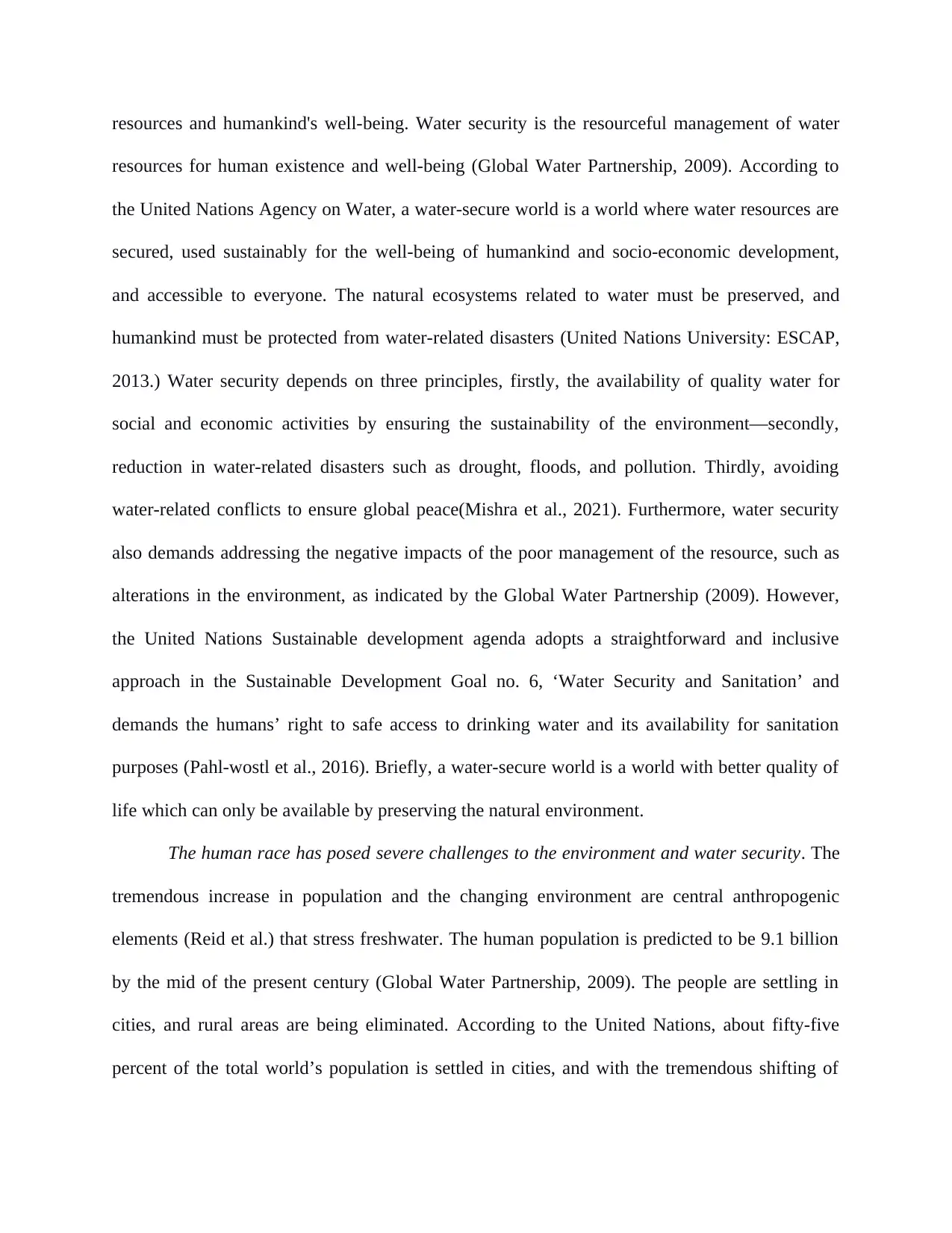
resources and humankind's well-being. Water security is the resourceful management of water
resources for human existence and well-being (Global Water Partnership, 2009). According to
the United Nations Agency on Water, a water-secure world is a world where water resources are
secured, used sustainably for the well-being of humankind and socio-economic development,
and accessible to everyone. The natural ecosystems related to water must be preserved, and
humankind must be protected from water-related disasters (United Nations University: ESCAP,
2013.) Water security depends on three principles, firstly, the availability of quality water for
social and economic activities by ensuring the sustainability of the environment—secondly,
reduction in water-related disasters such as drought, floods, and pollution. Thirdly, avoiding
water-related conflicts to ensure global peace(Mishra et al., 2021). Furthermore, water security
also demands addressing the negative impacts of the poor management of the resource, such as
alterations in the environment, as indicated by the Global Water Partnership (2009). However,
the United Nations Sustainable development agenda adopts a straightforward and inclusive
approach in the Sustainable Development Goal no. 6, ‘Water Security and Sanitation’ and
demands the humans’ right to safe access to drinking water and its availability for sanitation
purposes (Pahl-wostl et al., 2016). Briefly, a water-secure world is a world with better quality of
life which can only be available by preserving the natural environment.
The human race has posed severe challenges to the environment and water security. The
tremendous increase in population and the changing environment are central anthropogenic
elements (Reid et al.) that stress freshwater. The human population is predicted to be 9.1 billion
by the mid of the present century (Global Water Partnership, 2009). The people are settling in
cities, and rural areas are being eliminated. According to the United Nations, about fifty-five
percent of the total world’s population is settled in cities, and with the tremendous shifting of
resources for human existence and well-being (Global Water Partnership, 2009). According to
the United Nations Agency on Water, a water-secure world is a world where water resources are
secured, used sustainably for the well-being of humankind and socio-economic development,
and accessible to everyone. The natural ecosystems related to water must be preserved, and
humankind must be protected from water-related disasters (United Nations University: ESCAP,
2013.) Water security depends on three principles, firstly, the availability of quality water for
social and economic activities by ensuring the sustainability of the environment—secondly,
reduction in water-related disasters such as drought, floods, and pollution. Thirdly, avoiding
water-related conflicts to ensure global peace(Mishra et al., 2021). Furthermore, water security
also demands addressing the negative impacts of the poor management of the resource, such as
alterations in the environment, as indicated by the Global Water Partnership (2009). However,
the United Nations Sustainable development agenda adopts a straightforward and inclusive
approach in the Sustainable Development Goal no. 6, ‘Water Security and Sanitation’ and
demands the humans’ right to safe access to drinking water and its availability for sanitation
purposes (Pahl-wostl et al., 2016). Briefly, a water-secure world is a world with better quality of
life which can only be available by preserving the natural environment.
The human race has posed severe challenges to the environment and water security. The
tremendous increase in population and the changing environment are central anthropogenic
elements (Reid et al.) that stress freshwater. The human population is predicted to be 9.1 billion
by the mid of the present century (Global Water Partnership, 2009). The people are settling in
cities, and rural areas are being eliminated. According to the United Nations, about fifty-five
percent of the total world’s population is settled in cities, and with the tremendous shifting of
⊘ This is a preview!⊘
Do you want full access?
Subscribe today to unlock all pages.

Trusted by 1+ million students worldwide
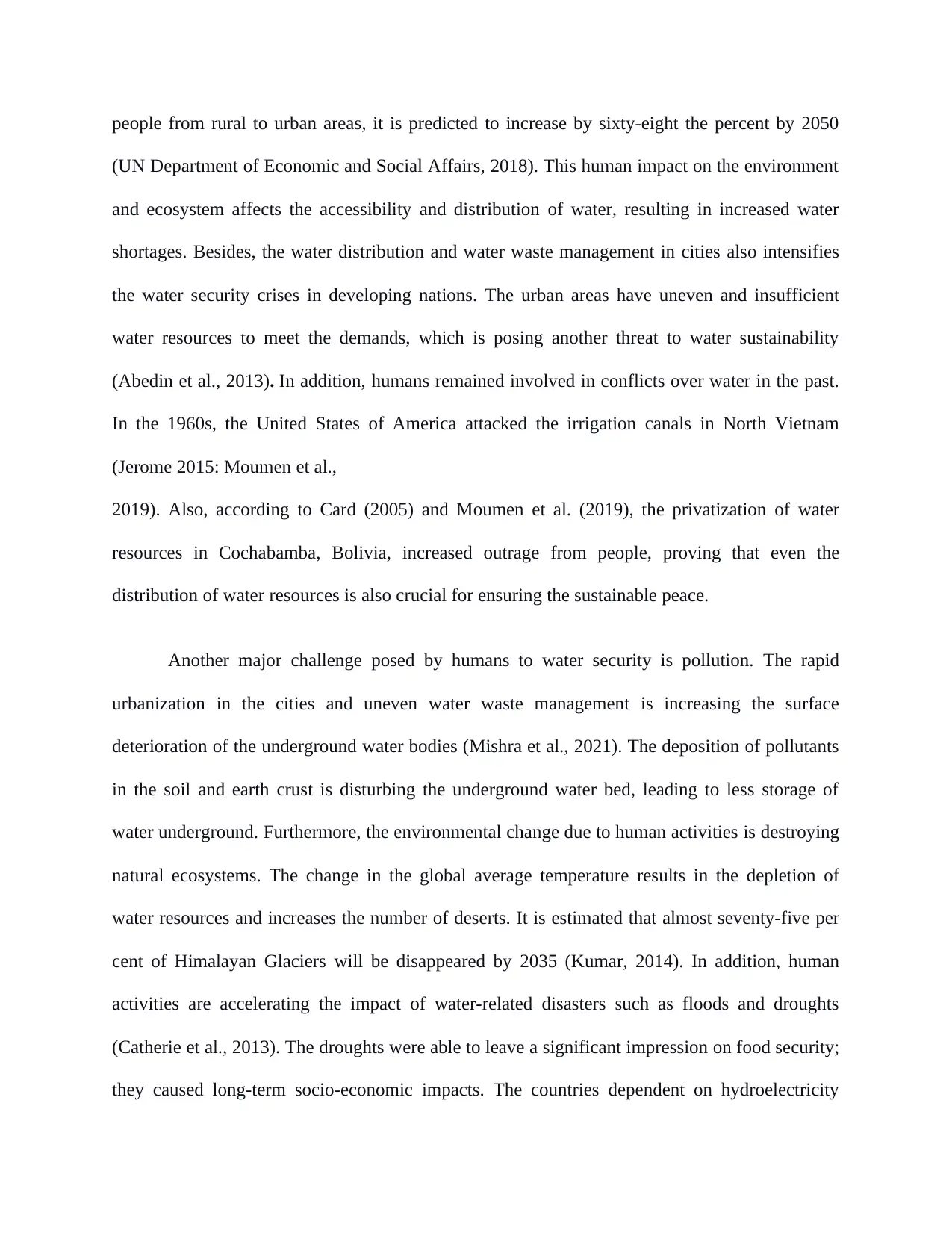
people from rural to urban areas, it is predicted to increase by sixty-eight the percent by 2050
(UN Department of Economic and Social Affairs, 2018). This human impact on the environment
and ecosystem affects the accessibility and distribution of water, resulting in increased water
shortages. Besides, the water distribution and water waste management in cities also intensifies
the water security crises in developing nations. The urban areas have uneven and insufficient
water resources to meet the demands, which is posing another threat to water sustainability
(Abedin et al., 2013). In addition, humans remained involved in conflicts over water in the past.
In the 1960s, the United States of America attacked the irrigation canals in North Vietnam
(Jerome 2015: Moumen et al.,
2019). Also, according to Card (2005) and Moumen et al. (2019), the privatization of water
resources in Cochabamba, Bolivia, increased outrage from people, proving that even the
distribution of water resources is also crucial for ensuring the sustainable peace.
Another major challenge posed by humans to water security is pollution. The rapid
urbanization in the cities and uneven water waste management is increasing the surface
deterioration of the underground water bodies (Mishra et al., 2021). The deposition of pollutants
in the soil and earth crust is disturbing the underground water bed, leading to less storage of
water underground. Furthermore, the environmental change due to human activities is destroying
natural ecosystems. The change in the global average temperature results in the depletion of
water resources and increases the number of deserts. It is estimated that almost seventy-five per
cent of Himalayan Glaciers will be disappeared by 2035 (Kumar, 2014). In addition, human
activities are accelerating the impact of water-related disasters such as floods and droughts
(Catherie et al., 2013). The droughts were able to leave a significant impression on food security;
they caused long-term socio-economic impacts. The countries dependent on hydroelectricity
(UN Department of Economic and Social Affairs, 2018). This human impact on the environment
and ecosystem affects the accessibility and distribution of water, resulting in increased water
shortages. Besides, the water distribution and water waste management in cities also intensifies
the water security crises in developing nations. The urban areas have uneven and insufficient
water resources to meet the demands, which is posing another threat to water sustainability
(Abedin et al., 2013). In addition, humans remained involved in conflicts over water in the past.
In the 1960s, the United States of America attacked the irrigation canals in North Vietnam
(Jerome 2015: Moumen et al.,
2019). Also, according to Card (2005) and Moumen et al. (2019), the privatization of water
resources in Cochabamba, Bolivia, increased outrage from people, proving that even the
distribution of water resources is also crucial for ensuring the sustainable peace.
Another major challenge posed by humans to water security is pollution. The rapid
urbanization in the cities and uneven water waste management is increasing the surface
deterioration of the underground water bodies (Mishra et al., 2021). The deposition of pollutants
in the soil and earth crust is disturbing the underground water bed, leading to less storage of
water underground. Furthermore, the environmental change due to human activities is destroying
natural ecosystems. The change in the global average temperature results in the depletion of
water resources and increases the number of deserts. It is estimated that almost seventy-five per
cent of Himalayan Glaciers will be disappeared by 2035 (Kumar, 2014). In addition, human
activities are accelerating the impact of water-related disasters such as floods and droughts
(Catherie et al., 2013). The droughts were able to leave a significant impression on food security;
they caused long-term socio-economic impacts. The countries dependent on hydroelectricity
Paraphrase This Document
Need a fresh take? Get an instant paraphrase of this document with our AI Paraphraser
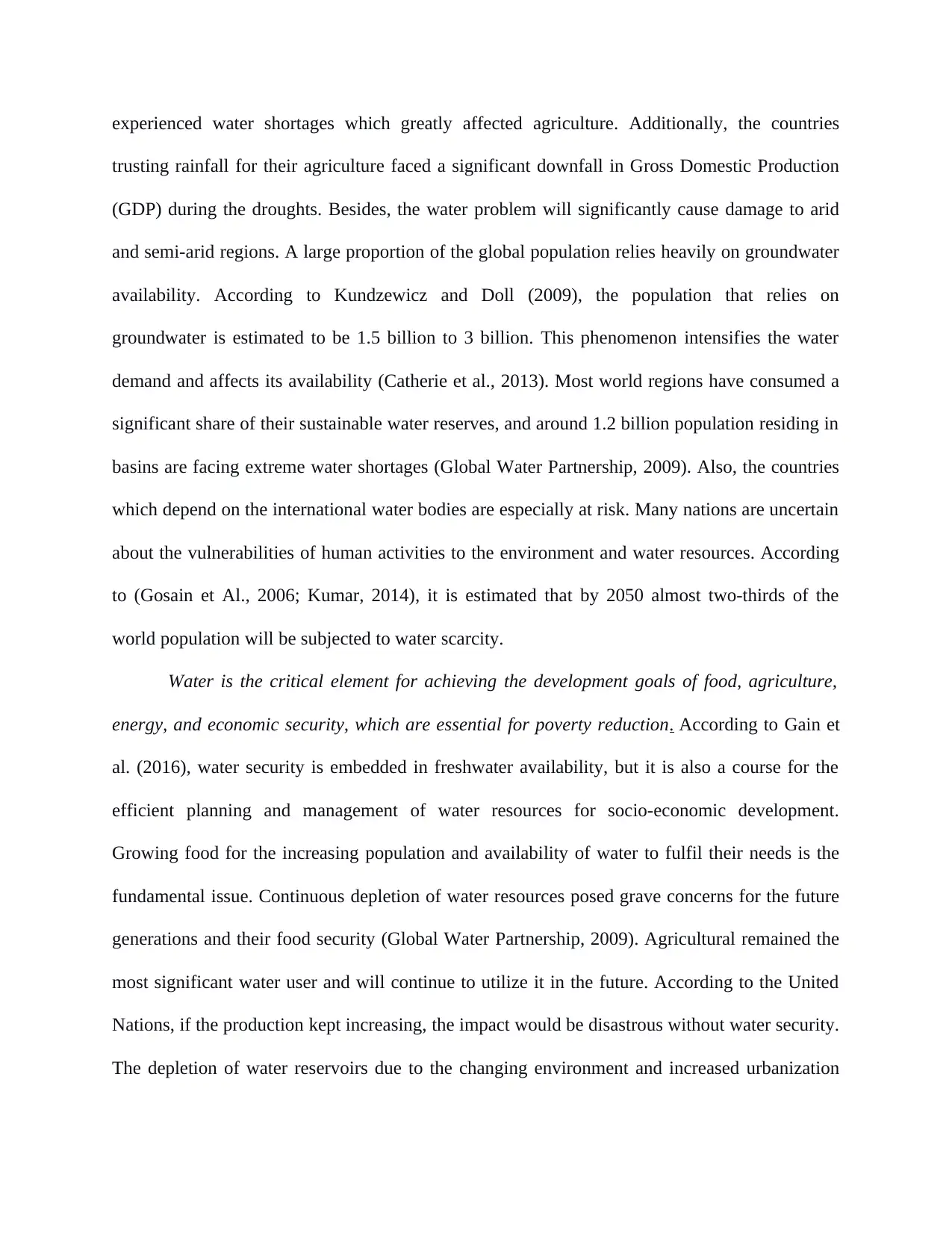
experienced water shortages which greatly affected agriculture. Additionally, the countries
trusting rainfall for their agriculture faced a significant downfall in Gross Domestic Production
(GDP) during the droughts. Besides, the water problem will significantly cause damage to arid
and semi-arid regions. A large proportion of the global population relies heavily on groundwater
availability. According to Kundzewicz and Doll (2009), the population that relies on
groundwater is estimated to be 1.5 billion to 3 billion. This phenomenon intensifies the water
demand and affects its availability (Catherie et al., 2013). Most world regions have consumed a
significant share of their sustainable water reserves, and around 1.2 billion population residing in
basins are facing extreme water shortages (Global Water Partnership, 2009). Also, the countries
which depend on the international water bodies are especially at risk. Many nations are uncertain
about the vulnerabilities of human activities to the environment and water resources. According
to (Gosain et Al., 2006; Kumar, 2014), it is estimated that by 2050 almost two-thirds of the
world population will be subjected to water scarcity.
Water is the critical element for achieving the development goals of food, agriculture,
energy, and economic security, which are essential for poverty reduction. According to Gain et
al. (2016), water security is embedded in freshwater availability, but it is also a course for the
efficient planning and management of water resources for socio-economic development.
Growing food for the increasing population and availability of water to fulfil their needs is the
fundamental issue. Continuous depletion of water resources posed grave concerns for the future
generations and their food security (Global Water Partnership, 2009). Agricultural remained the
most significant water user and will continue to utilize it in the future. According to the United
Nations, if the production kept increasing, the impact would be disastrous without water security.
The depletion of water reservoirs due to the changing environment and increased urbanization
trusting rainfall for their agriculture faced a significant downfall in Gross Domestic Production
(GDP) during the droughts. Besides, the water problem will significantly cause damage to arid
and semi-arid regions. A large proportion of the global population relies heavily on groundwater
availability. According to Kundzewicz and Doll (2009), the population that relies on
groundwater is estimated to be 1.5 billion to 3 billion. This phenomenon intensifies the water
demand and affects its availability (Catherie et al., 2013). Most world regions have consumed a
significant share of their sustainable water reserves, and around 1.2 billion population residing in
basins are facing extreme water shortages (Global Water Partnership, 2009). Also, the countries
which depend on the international water bodies are especially at risk. Many nations are uncertain
about the vulnerabilities of human activities to the environment and water resources. According
to (Gosain et Al., 2006; Kumar, 2014), it is estimated that by 2050 almost two-thirds of the
world population will be subjected to water scarcity.
Water is the critical element for achieving the development goals of food, agriculture,
energy, and economic security, which are essential for poverty reduction. According to Gain et
al. (2016), water security is embedded in freshwater availability, but it is also a course for the
efficient planning and management of water resources for socio-economic development.
Growing food for the increasing population and availability of water to fulfil their needs is the
fundamental issue. Continuous depletion of water resources posed grave concerns for the future
generations and their food security (Global Water Partnership, 2009). Agricultural remained the
most significant water user and will continue to utilize it in the future. According to the United
Nations, if the production kept increasing, the impact would be disastrous without water security.
The depletion of water reservoirs due to the changing environment and increased urbanization
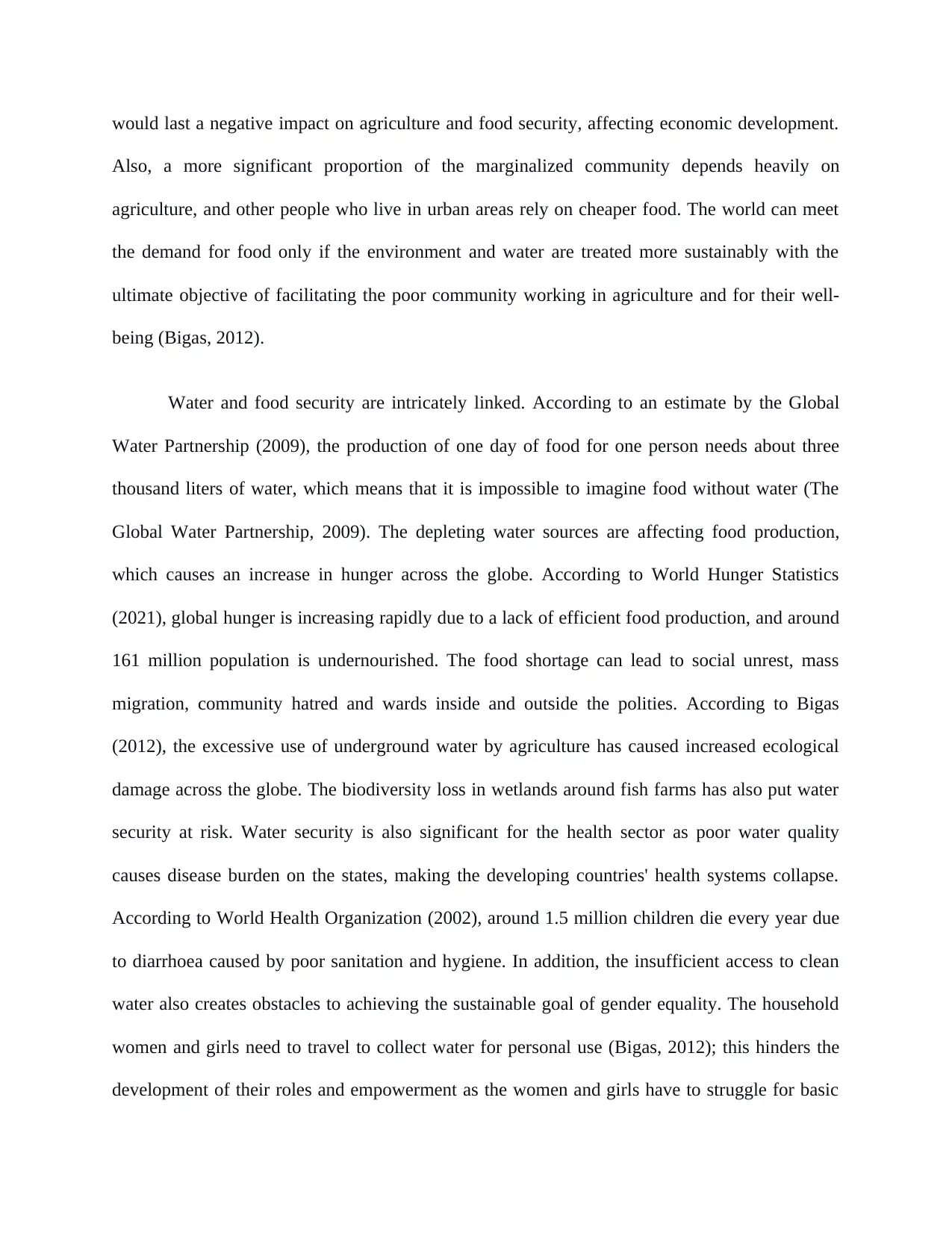
would last a negative impact on agriculture and food security, affecting economic development.
Also, a more significant proportion of the marginalized community depends heavily on
agriculture, and other people who live in urban areas rely on cheaper food. The world can meet
the demand for food only if the environment and water are treated more sustainably with the
ultimate objective of facilitating the poor community working in agriculture and for their well-
being (Bigas, 2012).
Water and food security are intricately linked. According to an estimate by the Global
Water Partnership (2009), the production of one day of food for one person needs about three
thousand liters of water, which means that it is impossible to imagine food without water (The
Global Water Partnership, 2009). The depleting water sources are affecting food production,
which causes an increase in hunger across the globe. According to World Hunger Statistics
(2021), global hunger is increasing rapidly due to a lack of efficient food production, and around
161 million population is undernourished. The food shortage can lead to social unrest, mass
migration, community hatred and wards inside and outside the polities. According to Bigas
(2012), the excessive use of underground water by agriculture has caused increased ecological
damage across the globe. The biodiversity loss in wetlands around fish farms has also put water
security at risk. Water security is also significant for the health sector as poor water quality
causes disease burden on the states, making the developing countries' health systems collapse.
According to World Health Organization (2002), around 1.5 million children die every year due
to diarrhoea caused by poor sanitation and hygiene. In addition, the insufficient access to clean
water also creates obstacles to achieving the sustainable goal of gender equality. The household
women and girls need to travel to collect water for personal use (Bigas, 2012); this hinders the
development of their roles and empowerment as the women and girls have to struggle for basic
Also, a more significant proportion of the marginalized community depends heavily on
agriculture, and other people who live in urban areas rely on cheaper food. The world can meet
the demand for food only if the environment and water are treated more sustainably with the
ultimate objective of facilitating the poor community working in agriculture and for their well-
being (Bigas, 2012).
Water and food security are intricately linked. According to an estimate by the Global
Water Partnership (2009), the production of one day of food for one person needs about three
thousand liters of water, which means that it is impossible to imagine food without water (The
Global Water Partnership, 2009). The depleting water sources are affecting food production,
which causes an increase in hunger across the globe. According to World Hunger Statistics
(2021), global hunger is increasing rapidly due to a lack of efficient food production, and around
161 million population is undernourished. The food shortage can lead to social unrest, mass
migration, community hatred and wards inside and outside the polities. According to Bigas
(2012), the excessive use of underground water by agriculture has caused increased ecological
damage across the globe. The biodiversity loss in wetlands around fish farms has also put water
security at risk. Water security is also significant for the health sector as poor water quality
causes disease burden on the states, making the developing countries' health systems collapse.
According to World Health Organization (2002), around 1.5 million children die every year due
to diarrhoea caused by poor sanitation and hygiene. In addition, the insufficient access to clean
water also creates obstacles to achieving the sustainable goal of gender equality. The household
women and girls need to travel to collect water for personal use (Bigas, 2012); this hinders the
development of their roles and empowerment as the women and girls have to struggle for basic
⊘ This is a preview!⊘
Do you want full access?
Subscribe today to unlock all pages.

Trusted by 1+ million students worldwide
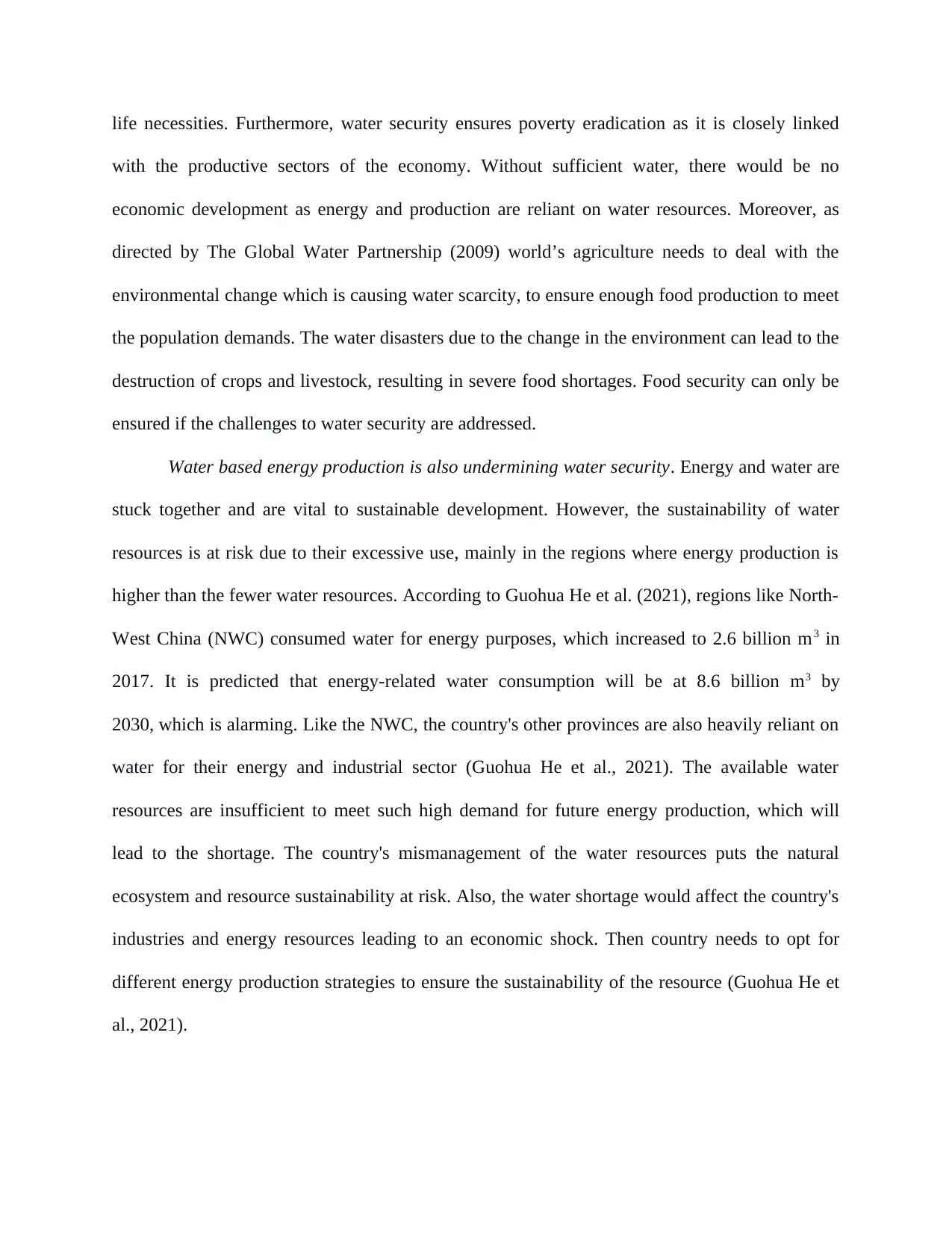
life necessities. Furthermore, water security ensures poverty eradication as it is closely linked
with the productive sectors of the economy. Without sufficient water, there would be no
economic development as energy and production are reliant on water resources. Moreover, as
directed by The Global Water Partnership (2009) world’s agriculture needs to deal with the
environmental change which is causing water scarcity, to ensure enough food production to meet
the population demands. The water disasters due to the change in the environment can lead to the
destruction of crops and livestock, resulting in severe food shortages. Food security can only be
ensured if the challenges to water security are addressed.
Water based energy production is also undermining water security. Energy and water are
stuck together and are vital to sustainable development. However, the sustainability of water
resources is at risk due to their excessive use, mainly in the regions where energy production is
higher than the fewer water resources. According to Guohua He et al. (2021), regions like North-
West China (NWC) consumed water for energy purposes, which increased to 2.6 billion m3 in
2017. It is predicted that energy-related water consumption will be at 8.6 billion m3 by
2030, which is alarming. Like the NWC, the country's other provinces are also heavily reliant on
water for their energy and industrial sector (Guohua He et al., 2021). The available water
resources are insufficient to meet such high demand for future energy production, which will
lead to the shortage. The country's mismanagement of the water resources puts the natural
ecosystem and resource sustainability at risk. Also, the water shortage would affect the country's
industries and energy resources leading to an economic shock. Then country needs to opt for
different energy production strategies to ensure the sustainability of the resource (Guohua He et
al., 2021).
with the productive sectors of the economy. Without sufficient water, there would be no
economic development as energy and production are reliant on water resources. Moreover, as
directed by The Global Water Partnership (2009) world’s agriculture needs to deal with the
environmental change which is causing water scarcity, to ensure enough food production to meet
the population demands. The water disasters due to the change in the environment can lead to the
destruction of crops and livestock, resulting in severe food shortages. Food security can only be
ensured if the challenges to water security are addressed.
Water based energy production is also undermining water security. Energy and water are
stuck together and are vital to sustainable development. However, the sustainability of water
resources is at risk due to their excessive use, mainly in the regions where energy production is
higher than the fewer water resources. According to Guohua He et al. (2021), regions like North-
West China (NWC) consumed water for energy purposes, which increased to 2.6 billion m3 in
2017. It is predicted that energy-related water consumption will be at 8.6 billion m3 by
2030, which is alarming. Like the NWC, the country's other provinces are also heavily reliant on
water for their energy and industrial sector (Guohua He et al., 2021). The available water
resources are insufficient to meet such high demand for future energy production, which will
lead to the shortage. The country's mismanagement of the water resources puts the natural
ecosystem and resource sustainability at risk. Also, the water shortage would affect the country's
industries and energy resources leading to an economic shock. Then country needs to opt for
different energy production strategies to ensure the sustainability of the resource (Guohua He et
al., 2021).
Paraphrase This Document
Need a fresh take? Get an instant paraphrase of this document with our AI Paraphraser
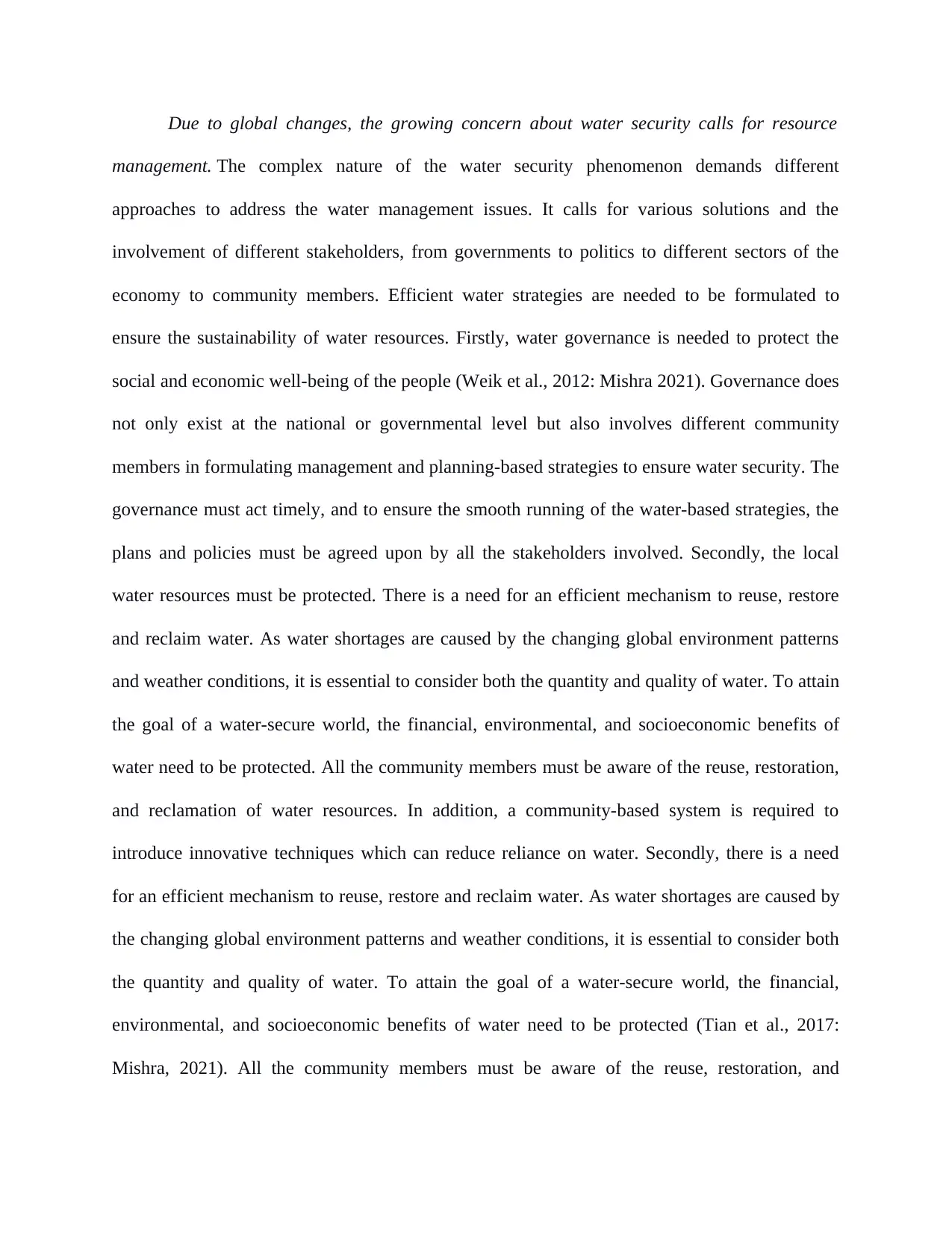
Due to global changes, the growing concern about water security calls for resource
management. The complex nature of the water security phenomenon demands different
approaches to address the water management issues. It calls for various solutions and the
involvement of different stakeholders, from governments to politics to different sectors of the
economy to community members. Efficient water strategies are needed to be formulated to
ensure the sustainability of water resources. Firstly, water governance is needed to protect the
social and economic well-being of the people (Weik et al., 2012: Mishra 2021). Governance does
not only exist at the national or governmental level but also involves different community
members in formulating management and planning-based strategies to ensure water security. The
governance must act timely, and to ensure the smooth running of the water-based strategies, the
plans and policies must be agreed upon by all the stakeholders involved. Secondly, the local
water resources must be protected. There is a need for an efficient mechanism to reuse, restore
and reclaim water. As water shortages are caused by the changing global environment patterns
and weather conditions, it is essential to consider both the quantity and quality of water. To attain
the goal of a water-secure world, the financial, environmental, and socioeconomic benefits of
water need to be protected. All the community members must be aware of the reuse, restoration,
and reclamation of water resources. In addition, a community-based system is required to
introduce innovative techniques which can reduce reliance on water. Secondly, there is a need
for an efficient mechanism to reuse, restore and reclaim water. As water shortages are caused by
the changing global environment patterns and weather conditions, it is essential to consider both
the quantity and quality of water. To attain the goal of a water-secure world, the financial,
environmental, and socioeconomic benefits of water need to be protected (Tian et al., 2017:
Mishra, 2021). All the community members must be aware of the reuse, restoration, and
management. The complex nature of the water security phenomenon demands different
approaches to address the water management issues. It calls for various solutions and the
involvement of different stakeholders, from governments to politics to different sectors of the
economy to community members. Efficient water strategies are needed to be formulated to
ensure the sustainability of water resources. Firstly, water governance is needed to protect the
social and economic well-being of the people (Weik et al., 2012: Mishra 2021). Governance does
not only exist at the national or governmental level but also involves different community
members in formulating management and planning-based strategies to ensure water security. The
governance must act timely, and to ensure the smooth running of the water-based strategies, the
plans and policies must be agreed upon by all the stakeholders involved. Secondly, the local
water resources must be protected. There is a need for an efficient mechanism to reuse, restore
and reclaim water. As water shortages are caused by the changing global environment patterns
and weather conditions, it is essential to consider both the quantity and quality of water. To attain
the goal of a water-secure world, the financial, environmental, and socioeconomic benefits of
water need to be protected. All the community members must be aware of the reuse, restoration,
and reclamation of water resources. In addition, a community-based system is required to
introduce innovative techniques which can reduce reliance on water. Secondly, there is a need
for an efficient mechanism to reuse, restore and reclaim water. As water shortages are caused by
the changing global environment patterns and weather conditions, it is essential to consider both
the quantity and quality of water. To attain the goal of a water-secure world, the financial,
environmental, and socioeconomic benefits of water need to be protected (Tian et al., 2017:
Mishra, 2021). All the community members must be aware of the reuse, restoration, and
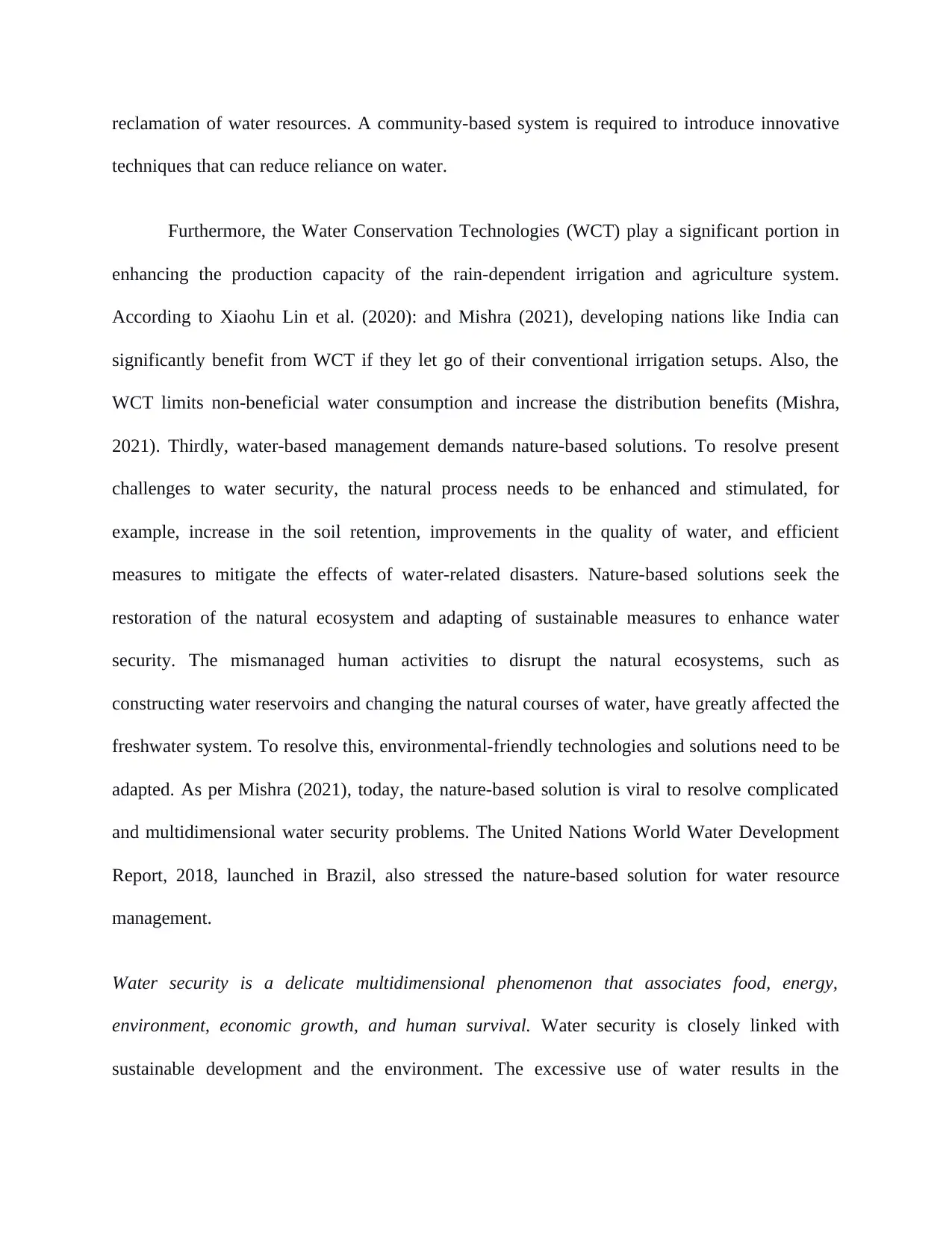
reclamation of water resources. A community-based system is required to introduce innovative
techniques that can reduce reliance on water.
Furthermore, the Water Conservation Technologies (WCT) play a significant portion in
enhancing the production capacity of the rain-dependent irrigation and agriculture system.
According to Xiaohu Lin et al. (2020): and Mishra (2021), developing nations like India can
significantly benefit from WCT if they let go of their conventional irrigation setups. Also, the
WCT limits non-beneficial water consumption and increase the distribution benefits (Mishra,
2021). Thirdly, water-based management demands nature-based solutions. To resolve present
challenges to water security, the natural process needs to be enhanced and stimulated, for
example, increase in the soil retention, improvements in the quality of water, and efficient
measures to mitigate the effects of water-related disasters. Nature-based solutions seek the
restoration of the natural ecosystem and adapting of sustainable measures to enhance water
security. The mismanaged human activities to disrupt the natural ecosystems, such as
constructing water reservoirs and changing the natural courses of water, have greatly affected the
freshwater system. To resolve this, environmental-friendly technologies and solutions need to be
adapted. As per Mishra (2021), today, the nature-based solution is viral to resolve complicated
and multidimensional water security problems. The United Nations World Water Development
Report, 2018, launched in Brazil, also stressed the nature-based solution for water resource
management.
Water security is a delicate multidimensional phenomenon that associates food, energy,
environment, economic growth, and human survival. Water security is closely linked with
sustainable development and the environment. The excessive use of water results in the
techniques that can reduce reliance on water.
Furthermore, the Water Conservation Technologies (WCT) play a significant portion in
enhancing the production capacity of the rain-dependent irrigation and agriculture system.
According to Xiaohu Lin et al. (2020): and Mishra (2021), developing nations like India can
significantly benefit from WCT if they let go of their conventional irrigation setups. Also, the
WCT limits non-beneficial water consumption and increase the distribution benefits (Mishra,
2021). Thirdly, water-based management demands nature-based solutions. To resolve present
challenges to water security, the natural process needs to be enhanced and stimulated, for
example, increase in the soil retention, improvements in the quality of water, and efficient
measures to mitigate the effects of water-related disasters. Nature-based solutions seek the
restoration of the natural ecosystem and adapting of sustainable measures to enhance water
security. The mismanaged human activities to disrupt the natural ecosystems, such as
constructing water reservoirs and changing the natural courses of water, have greatly affected the
freshwater system. To resolve this, environmental-friendly technologies and solutions need to be
adapted. As per Mishra (2021), today, the nature-based solution is viral to resolve complicated
and multidimensional water security problems. The United Nations World Water Development
Report, 2018, launched in Brazil, also stressed the nature-based solution for water resource
management.
Water security is a delicate multidimensional phenomenon that associates food, energy,
environment, economic growth, and human survival. Water security is closely linked with
sustainable development and the environment. The excessive use of water results in the
⊘ This is a preview!⊘
Do you want full access?
Subscribe today to unlock all pages.

Trusted by 1+ million students worldwide
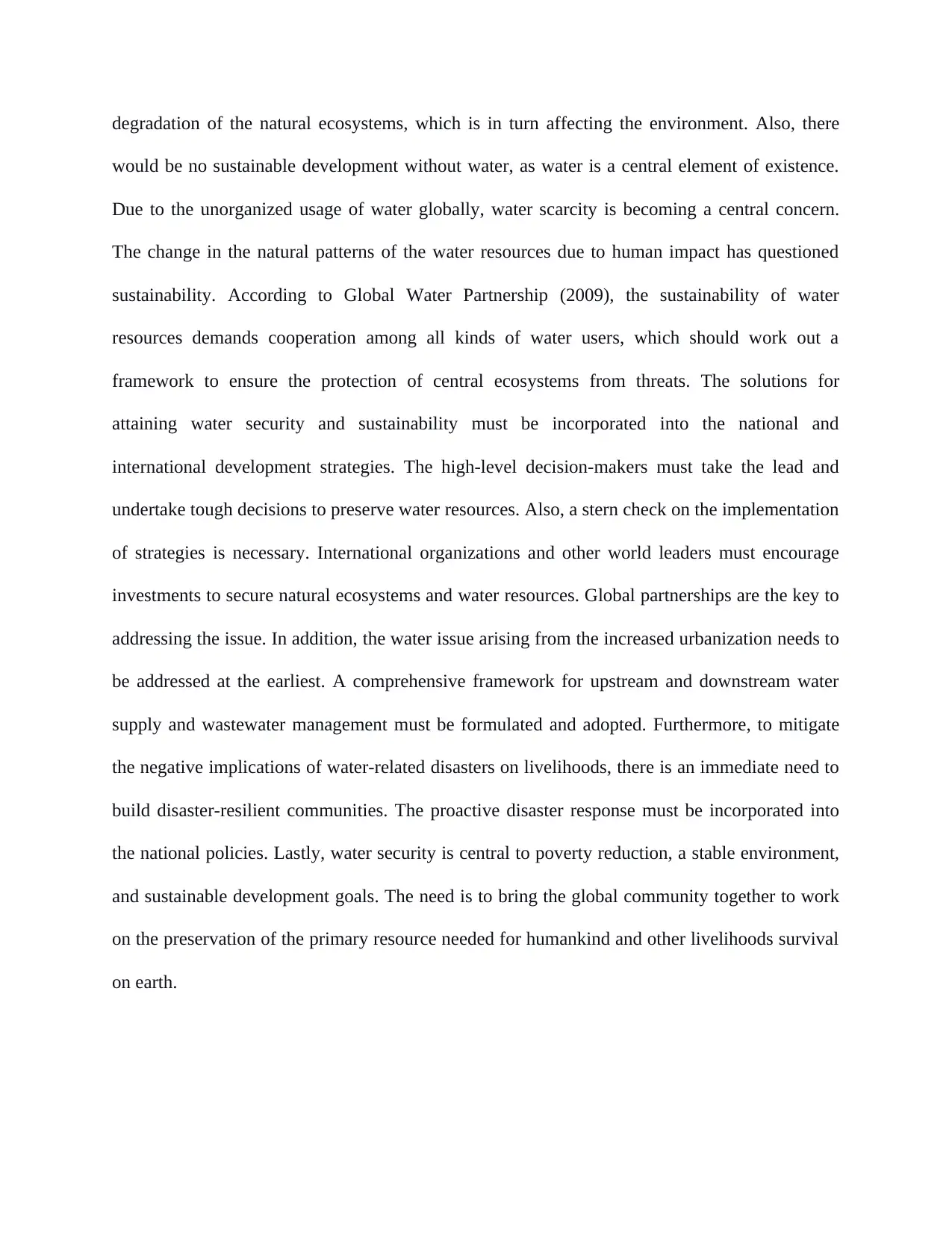
degradation of the natural ecosystems, which is in turn affecting the environment. Also, there
would be no sustainable development without water, as water is a central element of existence.
Due to the unorganized usage of water globally, water scarcity is becoming a central concern.
The change in the natural patterns of the water resources due to human impact has questioned
sustainability. According to Global Water Partnership (2009), the sustainability of water
resources demands cooperation among all kinds of water users, which should work out a
framework to ensure the protection of central ecosystems from threats. The solutions for
attaining water security and sustainability must be incorporated into the national and
international development strategies. The high-level decision-makers must take the lead and
undertake tough decisions to preserve water resources. Also, a stern check on the implementation
of strategies is necessary. International organizations and other world leaders must encourage
investments to secure natural ecosystems and water resources. Global partnerships are the key to
addressing the issue. In addition, the water issue arising from the increased urbanization needs to
be addressed at the earliest. A comprehensive framework for upstream and downstream water
supply and wastewater management must be formulated and adopted. Furthermore, to mitigate
the negative implications of water-related disasters on livelihoods, there is an immediate need to
build disaster-resilient communities. The proactive disaster response must be incorporated into
the national policies. Lastly, water security is central to poverty reduction, a stable environment,
and sustainable development goals. The need is to bring the global community together to work
on the preservation of the primary resource needed for humankind and other livelihoods survival
on earth.
would be no sustainable development without water, as water is a central element of existence.
Due to the unorganized usage of water globally, water scarcity is becoming a central concern.
The change in the natural patterns of the water resources due to human impact has questioned
sustainability. According to Global Water Partnership (2009), the sustainability of water
resources demands cooperation among all kinds of water users, which should work out a
framework to ensure the protection of central ecosystems from threats. The solutions for
attaining water security and sustainability must be incorporated into the national and
international development strategies. The high-level decision-makers must take the lead and
undertake tough decisions to preserve water resources. Also, a stern check on the implementation
of strategies is necessary. International organizations and other world leaders must encourage
investments to secure natural ecosystems and water resources. Global partnerships are the key to
addressing the issue. In addition, the water issue arising from the increased urbanization needs to
be addressed at the earliest. A comprehensive framework for upstream and downstream water
supply and wastewater management must be formulated and adopted. Furthermore, to mitigate
the negative implications of water-related disasters on livelihoods, there is an immediate need to
build disaster-resilient communities. The proactive disaster response must be incorporated into
the national policies. Lastly, water security is central to poverty reduction, a stable environment,
and sustainable development goals. The need is to bring the global community together to work
on the preservation of the primary resource needed for humankind and other livelihoods survival
on earth.
Paraphrase This Document
Need a fresh take? Get an instant paraphrase of this document with our AI Paraphraser
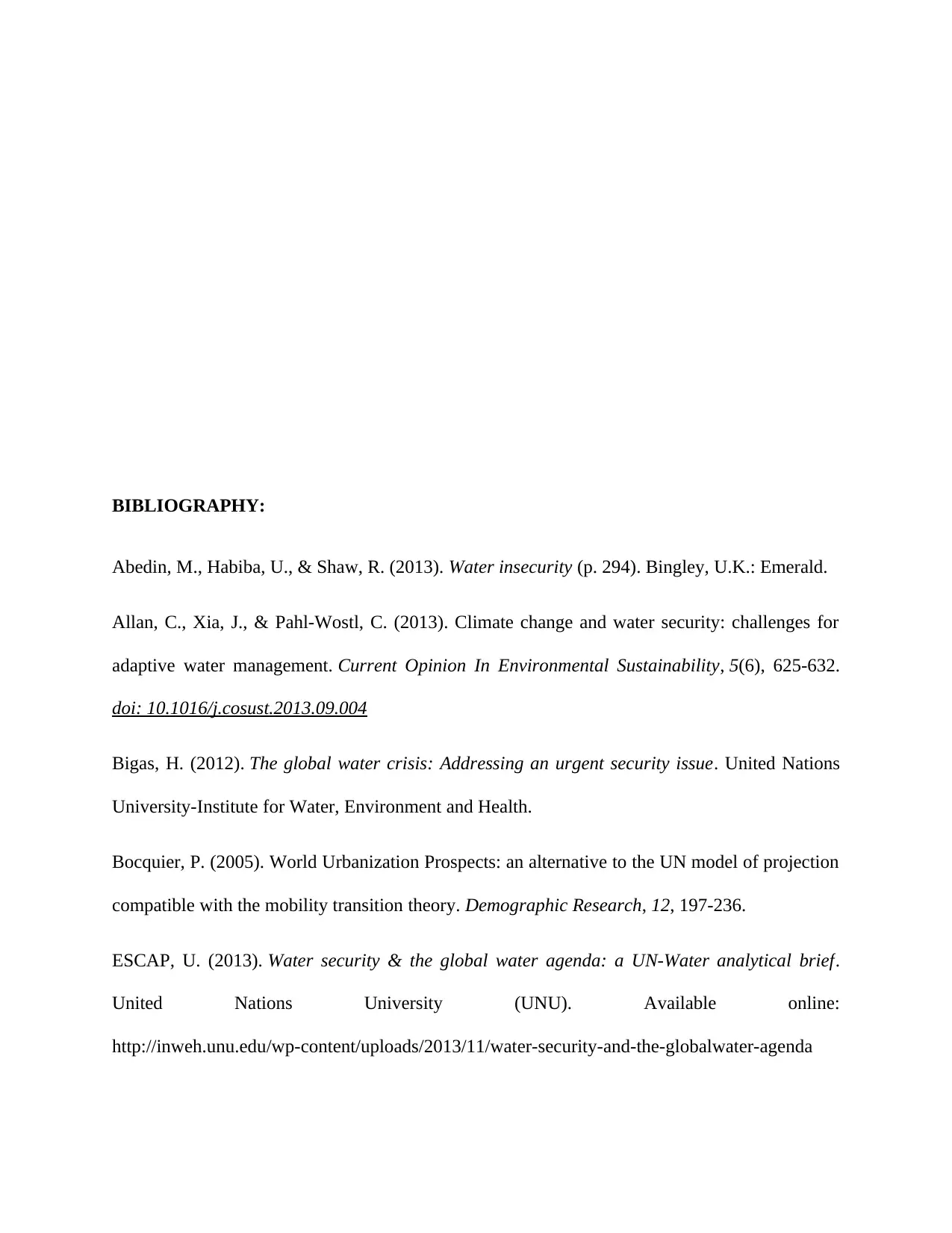
BIBLIOGRAPHY:
Abedin, M., Habiba, U., & Shaw, R. (2013). Water insecurity (p. 294). Bingley, U.K.: Emerald.
Allan, C., Xia, J., & Pahl-Wostl, C. (2013). Climate change and water security: challenges for
adaptive water management. Current Opinion In Environmental Sustainability, 5(6), 625-632.
doi: 10.1016/j.cosust.2013.09.004
Bigas, H. (2012). The global water crisis: Addressing an urgent security issue. United Nations
University-Institute for Water, Environment and Health.
Bocquier, P. (2005). World Urbanization Prospects: an alternative to the UN model of projection
compatible with the mobility transition theory. Demographic Research, 12, 197-236.
ESCAP, U. (2013). Water security & the global water agenda: a UN-Water analytical brief.
United Nations University (UNU). Available online:
http://inweh.unu.edu/wp-content/uploads/2013/11/water-security-and-the-globalwater-agenda
Abedin, M., Habiba, U., & Shaw, R. (2013). Water insecurity (p. 294). Bingley, U.K.: Emerald.
Allan, C., Xia, J., & Pahl-Wostl, C. (2013). Climate change and water security: challenges for
adaptive water management. Current Opinion In Environmental Sustainability, 5(6), 625-632.
doi: 10.1016/j.cosust.2013.09.004
Bigas, H. (2012). The global water crisis: Addressing an urgent security issue. United Nations
University-Institute for Water, Environment and Health.
Bocquier, P. (2005). World Urbanization Prospects: an alternative to the UN model of projection
compatible with the mobility transition theory. Demographic Research, 12, 197-236.
ESCAP, U. (2013). Water security & the global water agenda: a UN-Water analytical brief.
United Nations University (UNU). Available online:
http://inweh.unu.edu/wp-content/uploads/2013/11/water-security-and-the-globalwater-agenda
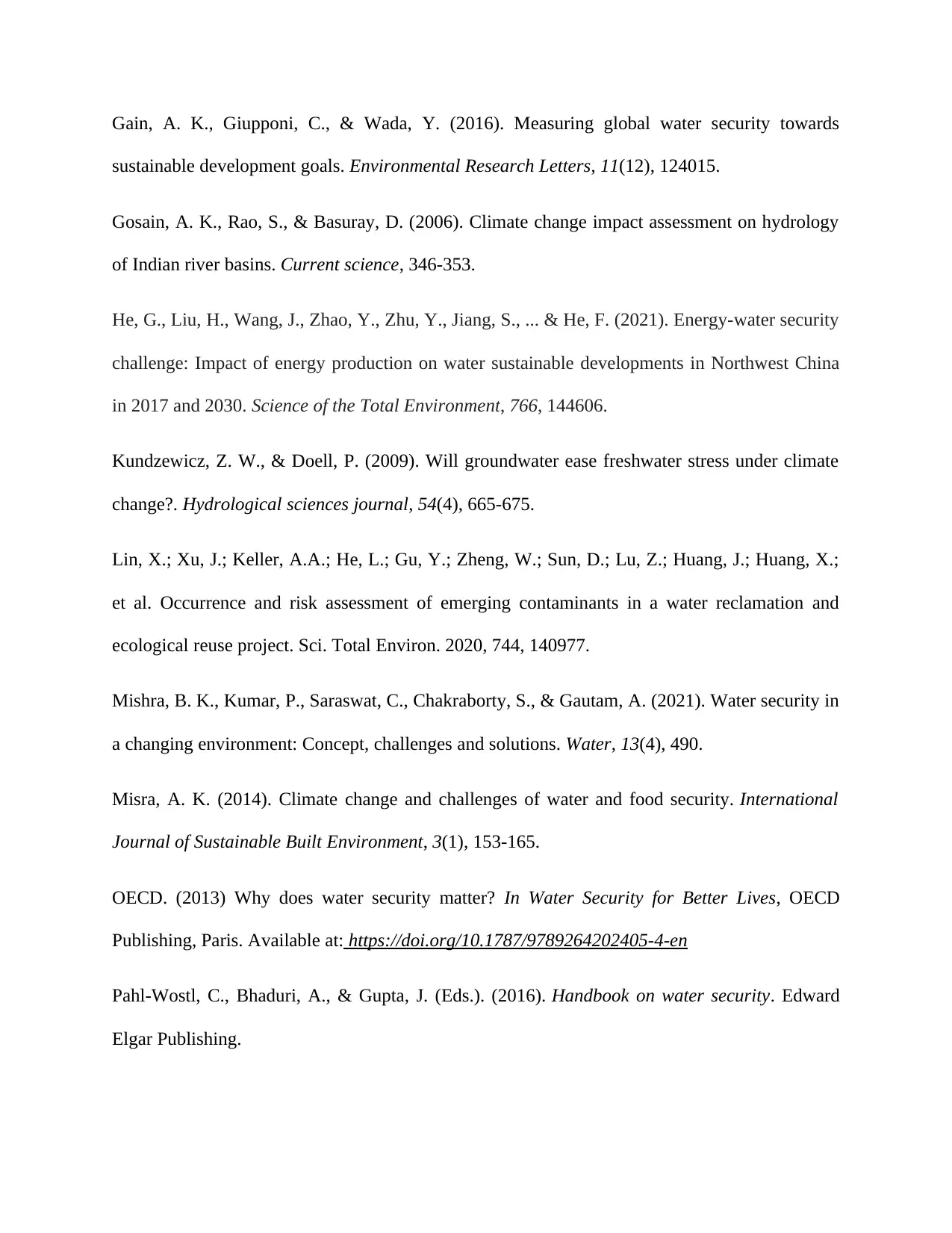
Gain, A. K., Giupponi, C., & Wada, Y. (2016). Measuring global water security towards
sustainable development goals. Environmental Research Letters, 11(12), 124015.
Gosain, A. K., Rao, S., & Basuray, D. (2006). Climate change impact assessment on hydrology
of Indian river basins. Current science, 346-353.
He, G., Liu, H., Wang, J., Zhao, Y., Zhu, Y., Jiang, S., ... & He, F. (2021). Energy-water security
challenge: Impact of energy production on water sustainable developments in Northwest China
in 2017 and 2030. Science of the Total Environment, 766, 144606.
Kundzewicz, Z. W., & Doell, P. (2009). Will groundwater ease freshwater stress under climate
change?. Hydrological sciences journal, 54(4), 665-675.
Lin, X.; Xu, J.; Keller, A.A.; He, L.; Gu, Y.; Zheng, W.; Sun, D.; Lu, Z.; Huang, J.; Huang, X.;
et al. Occurrence and risk assessment of emerging contaminants in a water reclamation and
ecological reuse project. Sci. Total Environ. 2020, 744, 140977.
Mishra, B. K., Kumar, P., Saraswat, C., Chakraborty, S., & Gautam, A. (2021). Water security in
a changing environment: Concept, challenges and solutions. Water, 13(4), 490.
Misra, A. K. (2014). Climate change and challenges of water and food security. International
Journal of Sustainable Built Environment, 3(1), 153-165.
OECD. (2013) Why does water security matter? In Water Security for Better Lives, OECD
Publishing, Paris. Available at: https://doi.org/10.1787/9789264202405-4-en
Pahl-Wostl, C., Bhaduri, A., & Gupta, J. (Eds.). (2016). Handbook on water security. Edward
Elgar Publishing.
sustainable development goals. Environmental Research Letters, 11(12), 124015.
Gosain, A. K., Rao, S., & Basuray, D. (2006). Climate change impact assessment on hydrology
of Indian river basins. Current science, 346-353.
He, G., Liu, H., Wang, J., Zhao, Y., Zhu, Y., Jiang, S., ... & He, F. (2021). Energy-water security
challenge: Impact of energy production on water sustainable developments in Northwest China
in 2017 and 2030. Science of the Total Environment, 766, 144606.
Kundzewicz, Z. W., & Doell, P. (2009). Will groundwater ease freshwater stress under climate
change?. Hydrological sciences journal, 54(4), 665-675.
Lin, X.; Xu, J.; Keller, A.A.; He, L.; Gu, Y.; Zheng, W.; Sun, D.; Lu, Z.; Huang, J.; Huang, X.;
et al. Occurrence and risk assessment of emerging contaminants in a water reclamation and
ecological reuse project. Sci. Total Environ. 2020, 744, 140977.
Mishra, B. K., Kumar, P., Saraswat, C., Chakraborty, S., & Gautam, A. (2021). Water security in
a changing environment: Concept, challenges and solutions. Water, 13(4), 490.
Misra, A. K. (2014). Climate change and challenges of water and food security. International
Journal of Sustainable Built Environment, 3(1), 153-165.
OECD. (2013) Why does water security matter? In Water Security for Better Lives, OECD
Publishing, Paris. Available at: https://doi.org/10.1787/9789264202405-4-en
Pahl-Wostl, C., Bhaduri, A., & Gupta, J. (Eds.). (2016). Handbook on water security. Edward
Elgar Publishing.
⊘ This is a preview!⊘
Do you want full access?
Subscribe today to unlock all pages.

Trusted by 1+ million students worldwide
1 out of 13
Related Documents
Your All-in-One AI-Powered Toolkit for Academic Success.
+13062052269
info@desklib.com
Available 24*7 on WhatsApp / Email
![[object Object]](/_next/static/media/star-bottom.7253800d.svg)
Unlock your academic potential
Copyright © 2020–2025 A2Z Services. All Rights Reserved. Developed and managed by ZUCOL.




